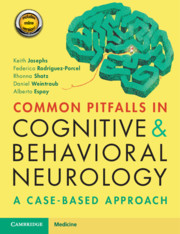Book contents
- Common Pitfalls in Cognitive and Behavioral Neurology
- Common Pitfalls in Cognitive and Behavioral Neurology
- Copyright page
- Dedication
- Contents
- Diseases Discussed in the Book
- Preface
- Acknowledgements
- Abbreviations
- Part 1 Missing the Diagnosis Altogether
- Part 2 Misidentifying the Impaired Cognitive Domain
- Part 3 Missing Important Clues in the History
- Part 4 Failure of Pattern Recognition
- Part 5 Difficult-to-Characterize Cognitive/Behavioral Disorders
- Case 21 Difficulty with Language: When Is It Not Aphasia?
- Case 22 Frontal, Parietal, or Neither?
- Case 23 Cognitive Impairment as an Unexpected Guest
- Case 24 Punch Drunk
- Case 25 Remembering without Knowing
- Part 6 Clinical Findings That Are Subtle
- Part 7 Misinterpreting Test Results
- Part 8 Attributing Findings to a Known or Suspected Disorder
- Part 9 Missing Radiographic Clues
- Part 10 Management Misadventures
- Index
- Plate Section (PDF Only)
- References
Case 22 - Frontal, Parietal, or Neither?
from Part 5 - Difficult-to-Characterize Cognitive/Behavioral Disorders
Published online by Cambridge University Press: 03 November 2020
- Common Pitfalls in Cognitive and Behavioral Neurology
- Common Pitfalls in Cognitive and Behavioral Neurology
- Copyright page
- Dedication
- Contents
- Diseases Discussed in the Book
- Preface
- Acknowledgements
- Abbreviations
- Part 1 Missing the Diagnosis Altogether
- Part 2 Misidentifying the Impaired Cognitive Domain
- Part 3 Missing Important Clues in the History
- Part 4 Failure of Pattern Recognition
- Part 5 Difficult-to-Characterize Cognitive/Behavioral Disorders
- Case 21 Difficulty with Language: When Is It Not Aphasia?
- Case 22 Frontal, Parietal, or Neither?
- Case 23 Cognitive Impairment as an Unexpected Guest
- Case 24 Punch Drunk
- Case 25 Remembering without Knowing
- Part 6 Clinical Findings That Are Subtle
- Part 7 Misinterpreting Test Results
- Part 8 Attributing Findings to a Known or Suspected Disorder
- Part 9 Missing Radiographic Clues
- Part 10 Management Misadventures
- Index
- Plate Section (PDF Only)
- References
Summary
This 23-year-old woman presented with a four-week history of balance impairment, short-term memory impairment, and irritability. Six weeks prior to her evaluation, she developed Epstein–Barr virus (EBV)-associated infectious mononucleosis, presenting with severe cervical lymphadenopathy and tonsillitis. She was treated with amoxicillin-clavulanate and subsequently prednisone (60 mg a day for 3 days, followed by a 10-day downward titration and discontinuation). Two weeks later, she noted imbalance and a tendency to fall toward the right, along with bilateral loss of hand dexterity. Except for occasional word-finding difficulties, she denied language changes. About the same time, her family noticed she would forget what she had recently been told, particularly lists, and had difficulty driving, damaging three car wheels. Both she and her family reported that her mood was uncharacteristically labile, and she would become easily upset over trivial issues. All of her symptoms peaked at two weeks from onset of imbalance and, since then, had been slowly improving over the subsequent two weeks.
- Type
- Chapter
- Information
- Common Pitfalls in Cognitive and Behavioral NeurologyA Case-Based Approach, pp. 71 - 74Publisher: Cambridge University PressPrint publication year: 2020



